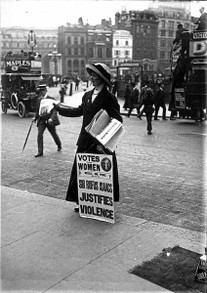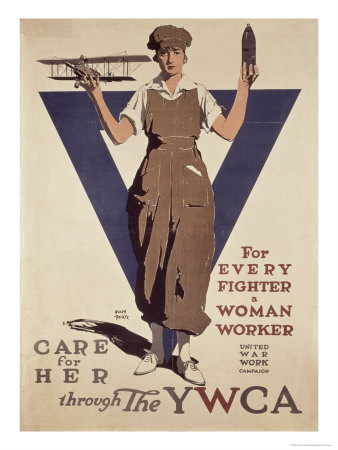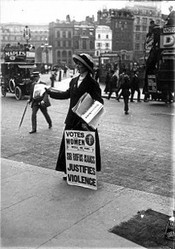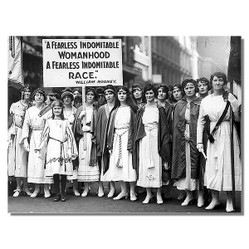There is a common misconception that feminism is not needed in modern Western societies. It carries connotations of man-hating, bra-burning, angry women with chips on their shoulders.
Consequently, feminism has become a touchy subject and, strangely, many women would not consider themselves to be feminists, let alone proudly claim to be one.
So, is it true that we really don’t need feminism anymore?
Well, when millions of women are forced into sexual slavery by human traffickers, violence against women is still frighteningly prevalent and a quarter of women have been victim of rape or attempted rape, the answer seems to be a resounding “no”.
And, even when it comes to the workplace, women have still not achieved equality. Despite almost two centuries of feminism, women are regularly paid less than their male counterparts and often run smack into the ‘glass ceiling’.
Very few countries have, or have had, female leaders. The chance of a female U.S. president still seems to be a long way away. And, currently, in the U.K., out of 646 MPs, only 126 are women.
In everyday, Western life, women have, ostensibly, succeeded in getting the worst of both worlds: still bearing the lion's share of childcare and domestic chores, while also attempting to hold down a career. Something tells me, this is not what the Pankhurst girls had in mind.
If we think we have truly achieved equality, we’re deluding ourselves. Of course, things have improved, but it is ridiculous to assume that feminism is no longer necessary. Instead, what we need to do is change how feminism is perceived and, in order to do that, more women (and men) need to embrace the cause for its core beliefs.
The truth is that there’s still a frighteningly long way to go. In this writer’s opinion, we dismiss the importance of feminism at our peril.









 How to Avoid College Debton 07/31/2014
How to Avoid College Debton 07/31/2014
 Was Charlotte Bronte Jealous of her Sister Anne?on 07/15/2014
Was Charlotte Bronte Jealous of her Sister Anne?on 07/15/2014
 Whose Side is Cancer Research UK on?on 07/06/2014
Whose Side is Cancer Research UK on?on 07/06/2014
 A Plot Summary of Electra by Sophocleson 07/05/2014
A Plot Summary of Electra by Sophocleson 07/05/2014



Comments
Hello, Cazort. Thanks for sharing your thoughts, I certainly don't disagree with them. For me, the problem is in how the word 'feminism' is used and perceived by the mainstream media and many other people. As far as I'm concerned, feminism is very simple - the principle that both genders should be viewed as equal; different, no question, but equal.
And the hope is that men and women should treat each other with respect. Far too many people think that the feminist aim is to somehow 'overthrow' men. It's not now, nor has it ever been, about trying to suggest women are more important than men - feminists throughout history have fought simply to be afforded the SAME rights as their male counterparts.
So, when I say everyone SHOULD be a feminist, I'm saying everyone should believe in that very, very basic principle: men and women should be treated equally, neither one gender nor the other seen as 'less important' or not deserving of certain rights.
It would all be much simpler if we human beings could live with the 'do as you would be done by' motto; regardless of gender, sexuality, religion, race or whatever else splits us into pigeonholes. Then the label 'feminist' wouldn't be necessary (solving the problem of how it's interpreted), but as we seem incapable of simply being kind to one another, individual calls for tolerance, acceptance and equality still need their own labels.
I don't believe in the word "should", so on that level, I actually disagree with the title of this page, but that's a whole other discussion--and it doesn't mean at all that I disagree with the goals of feminism. I used to identify as a feminist, and I don't think my views or commitments to women's rights and gender equality have changed at all...but I've come to think it is problematic to focus on labels like "feminist" though.
One thing that I've seen a lot lately on the internet is a lot of rhetoric (and it seems like political rhetoric more than real discourse) that paints a picture of "feminists and allies believe / do X, Y, and Z, so if you don't support all these things, you're not a feminist". I don't like this sort of way of thinking and I think it can be unnecessarily divisive. I also think that the all-or-nothing thinking ("You need to believe or agree with every last detail of this ideology, or you're part of the problem.") is very destructive.
Feminism is very complex and diverse and I don't like the idea of dividing people into "feminists" vs. "non-feminists" on the basis of stances on specific issues. I'd rather discuss the issues themselves, and work on building consensus on individual issues and then working to achieve changes in society and culture through this consensus. This is a very different approach than the building of "packaged" ideologies that are advanced through political means.
Personally, I believe that we have a long way to go towards achieving gender equality. Here in the U.S., I see a lot of things that point toward systematic discrimination against women...less representation of women in power structures like the presidency, congress, CEO's, etc., and deeper ways in which women are given a very hard time culturally, like all the twisted messages sent to women about body image, the shaming of women for expressing sexuality, and culture that blames victims of rape and sexual assault. But I also think men face their own unique struggles -- harsher stigmas for deviating from gender roles, and being more likely to be demonized or viewed as predators or aggressors even in the absence of evidence. Yet another reason I shy away from the "feminist" label is that I want to move away from thinking of a gender struggle of men vs. women and instead focus on working together and building a consensus.
WiseFool - How nice it is to be "fully embraced." That's nearly a hug. It's been a long time since I had a reasonable conversation with anybody about feminism. Back in the day, when I was a student and surrounded by feminists, there was less suspicion about why a white, anglo-saxon, protestant male should support the idea of equality. Now, we seem much more divided. That can only be a bad thing. It's OK to support an idea just because it's the right thing to do. You can write that on my headstone.
Hello Hollie, Glad you enjoyed the article. It's always great to hear women loudly and proudly state that they're feminists. I agree with your views on Jeremy Hunt, it's strange that men in power should be debating an exclusive female issue. Indeed, we do have a long way to go and, sadly, if women do not consider feminism relevant, I think true equality is going to remain a long way off.
John, lovely to hear from a man. Personally, I would fully embrace any man who wanted to be involved in the feminist movement. We women need more of you fellas on our side in order to achieve equality, because men, predominantly, remain at the helm. I think any woman who shuns a male feminist would be ridiculous in the extreme. I do, however, accept that there are 'social expectations' that make it hard for men to be openly feminist. I would say, George Bernard Shaw was a feminist (Germaine Greer would disagree with me), and if it was good enough for him, it should be good enough for any man today.
You absolutely nail it in the title of your article in suggesting that men need to be involved in the Feminist movement. The trouble is that for a man to declare himself a Feminist would be difficult (he would be resisted by female Feminists and seen as an intruder) and somewhat comical in a sexist sort of way. Being a bit "effeminate" or "getting in touch with his feminine side" are a couple of unhelpful stereotypes that get applied. As a result, men are excluded from an important debate about equality which concerns them as much as it concerns women.
Hi Wisefool,
I really enjoyed this piece. I will unashamedly confess that I'm a Feminist, a Marxist Feminist at that, you have no idea how many eyebrows have been raised when I make that statement :) Personally, I don't believe that we're anywhere near equality. Yes, levels of education are higher amongst women and girls, and yes, in some parts of the world we have greater rights regarding our reproductive decisions, but I also see some regression.
In the UK we now have a Conservative MP (male) who thinks the cut off for the termination of a pregnancy should be 12 weeks (I know termination is a different issue, but it infuriates me that a man feels that this particular issue is one which he should pontificate about) Women and children are also the worst hit by the public spending cuts. We have such a long way to go.
Interestingly, I'm from, and still reside in Manchester, the Pankhurst Centre is just a couple of miles from my house, and one of my favourite places!
Hello Cathy, thanks for the comment. You make a very interesting point. French feminism would, of course, take a slightly different view. Rather than trying to be perceived as 'the same' as men, they simply say vive la difference. You're absolutely right, women will never be the same as men, but I'm not sure that means we can't achieve equality. I can't argue that it's men's opinions that need to change, but I also see a worryingly large number of women of my generation (I'm in my late twenties), who don't think of themselves as feminists and that concerns me. Feminism is attached to all kinds of things, but it's only 'meaning' is a very simple one: belief that a woman should have the same rights that a man has. So, the fact that any woman can say "oh, no, I'm not a feminist" baffles me.
We're still not there yet are we. For me one of the most important issues is equal parenting. It's great when men can share childcare equally - and if they're pulling their weight at home then it gives women a fair chance at work!